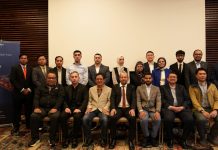Partnership for Development is the Sultanate’s Offset programme aimed at diversifying the national economy, strengthening the private sector and promoting human resource development and knowledge transfer in Oman, says Dr Dhafir Al Shanfari, CEO of Omani Authority for Partnership for Development, in an interview to Muhammed Nafie
In the world of defence procurement it is standard to supplement the main deal with a side contract, outlining additional investments that the winning bidder must make in local projects. Called ‘offset’, this is now an accepted practice in the aerospace and military industries in over 80 countries. Offset, which came of age during the years after the World War II, refers to a range of industrial and commercial compensation packages usually required as a condition of purchase from foreign suppliers, typically counter-balancing the outflow of funds resulting from large capital purchases.
Offset was first applied officially in Oman in 2000 by the Ministry of Defence to its military procurements through the introduction of the Partnership for Development (PFD) Programme. In 2008, the management of the programme was moved to the Ministry of Commerce and Industry where it continued to evolve, handling a wide range of projects in areas as diverse as aquaculture, SME development, pilot training, and training Omani nationals in critical risk management. Taking these initiatives into the next stage, in February 2014 a Royal Decree brought into being the Omani Authority for Partnership for Development (OAPFD), an independent public authority with its own board of trustees and management structure, tasked with the management and oversight of the PFD Programme.
Says Dr Dhafir Al Shanfari, CEO of the authority, “The OAPFD aims to help diversify the national economy, enhance the military and security capabilities, strengthen the private sector and promote knowledge transfer and human resource development.”
Explaining the objectives of OAPFD, Dhafir adds, “The remit of the authority includes the training and qualifying of Omani cadres, supporting small and medium enterprises, strengthening the private sector, enhancing technology in both government and private sectors, integrating modern technology in them, enhancing military and security capabilities of the Sultanate at all levels, facilitating investment, diversifying sources of national income, and creating an efficient and sustainable economy to be achieved by applying the PFD Programme.”
He avers that the PFD Programme is an important governmental tool that can help reduce dependency on oil as a primary source of income for the country and to reduce forex externalisation in the future. “Today some 80 countries apply offset to their procurements and that the objectives of the OAPFD is to creates job opportunities, diversify sources of national income and create an efficient and sustainable economy,” he adds.
Designed to legally require foreign contractors, benefitting from major projects in Oman, to give something back to the country, the PFD Programme aims to generate long-term self-sufficient projects that would diversify the sources of national income, support strategic sectors of the economy, enhance Oman’s defence and security capabilities, train Omani nationals, create job opportunities and strengthen the private sector.
Dhafir says, “The authority is also seeking to enhance military and security capabilities of the Sultanate at all levels, facilitate investment, strengthen the private sectors, enhance and integrate modern technology in both the government and private sectors, train Omani cadres and support small and medium enterprises (SMEs).”
The programme no longer only applies to defence procurements but to all procurements by the defence and security apparatus as well as to civil infrastructure procurements by government ministries and companies where the government holds more than 50 per cent stake.
“At the heart of the PFD Programme lies the promotion of the social and economic development of Oman. To this end, foreign companies that contract with the Oman government, or with a company in which the Oman government holds more than 50 per cent of the shares, must invest part of the value of that contract back into projects that will benefit Oman. There is a strong emphasis on the need for sustainability of such projects, so that the value they add will continue after the foreign contractor has been discharged.”
The PFD obligations apply to infrastructure and military or security equipment contracts in excess of RO5mn. In addition, they also apply to a contractor who is awarded several contracts the cumulative value of which exceeds RO5mn in a period of two years.
While the level of offset obligation set by the authority is 50 per cent of the value of the contract, it can be either direct or indirect. Direct offsets are related to the original contract whereas indirect offsets generally have nothing to do with what the country is purchasing. “Direct PFD is a transaction directly related to the supply agreement. Direct PFD is basically the same as In-country Value (ICV) usually in the form of co-production, subcontracting, production, licensed production, or possibly technology transfer, e.g. local manufacture of part of the equipment being purchased. Indirect PFD is a transaction unrelated to the supply agreement. PFD that may be considered indirect includes, investment, training, technology transfer and export development, e.g. setting up a training facility unrelated to the supply agreement.
The goal of the authority has been to create a set of regulations that offer flexibility based upon a collaborative approach that rewards achievement. The authority is looking to lay down a policy that is administratively straight forward, and will seek to gain acknowledgement of this through successful collaboration with its business partners. To ensure that the regulations for the PFD Programme not only addresses the needs of the Omani economy but also represents current best practice, in drafting the regulations a number of offset models were studied.






